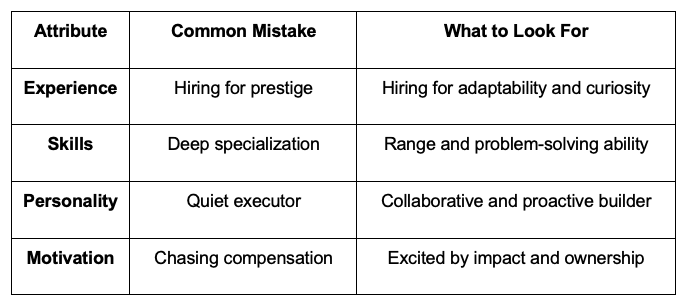Find out when to hire your first engineer, how to identify the right fit, and how to build a strong startup foundation without slowing your momentum.
Introduction
Hey founder, ever make a hire you regretted three months later?
A few years ago, I watched a nontechnical founder spend $200,000 on her first engineer. Not at a big company, but at a scrappy seed stage startup.
The code worked. The product didn’t.
Looking back, the problem wasn’t who she hired. It was when she was hired.
Most early-stage founders fall into the same trap. They rush to hire a “10x engineer” when what they really need first is clarity, focus, and a few solid hypotheses.
Hiring too soon doesn’t make you faster — it just scales your uncertainty.
When You’re Not Ready to Hire Your First Engineer Yet
Hiring your first engineer feels like progress, but if you move too soon, it can slow you down in the most expensive way possible. Here are a few signs you’re not ready yet.
If you’re still testing
product–market fit or rewriting your roadmap every few weeks, your problem isn’t execution. It’s clarity. Bringing on an engineer now only means you’ll rebuild everything later.
If you can deliver the next milestone with a no‑code tool, a freelancer, or a quick prototype, do that. It’s cheaper to learn with mockups than with full‑time hires.
Feeling slow doesn’t always mean you need help. Sometimes it means you’re not sure what matters most. An engineer can’t fix indecision — they’ll just code it faster.
If you can’t clearly explain what this engineer should build, own, or measure, you’re not ready yet. A vague goal like “help us move faster” isn’t a job description — it’s a warning sign.
The Founder Readiness Framework for Hiring Your First Engineer
Hiring your first engineer is one of those moments that feels huge — exciting and a little intimidating. Get it right and things start to click. Get it wrong and you’ll spend months rebuilding what you thought you were solving.
At SeekLab, we’ve seen this happen over and over again. Readiness has nothing to do with your funding round or user count. It comes down to whether you’ve built enough clarity and discipline to make that hire truly productive.
Here’s a simple framework to help you figure out if you’re there yet.
You can explain what needs to be built in one paragraph. Your roadmap isn’t a list of guesses — it’s grounded in what users actually need. If your goal still sounds like we just need someone technical to figure this out, you’re not ready. Before you hire, get clear on the problem, not the person.
You’ve hit a ceiling on progress that isn’t about decisions — it’s about execution. You know what needs to happen next, but your tools, time, or systems can’t keep up. When your vision is outpacing your ability to ship, that’s a good sign you’re ready to hire.
You’re solving the same problem every week. You’ve outgrown quick fixes and temporary patches, and now you need to build something that lasts. This is where an engineer brings real leverage — they turn chaos into structure.
You’re ready to focus and invest in building for the next six to twelve months. Hiring an engineer isn’t an experiment — it’s a partnership. You need the financial and mental runway to support that person through a full cycle of growth.
What to Look For in Your First Engineer at a Startup
Most early‑stage founders rush to hire for technical skill instead of long‑term fit. Your first engineer won’t just build your product; they’ll define how your company builds, communicates, and scales.
You don’t need someone who knows every framework or language. You need someone who can solve problems with limited context, ask smart questions, and keep moving when things are unclear. Look for curiosity, not perfection — the best early engineers care more about progress than polish.
In the early days, everything changes quickly. Your first engineer should be comfortable jumping between product, infrastructure, and user feedback. They don’t need to be an expert in everything — just willing to figure things out as they go.
As a nontechnical founder, clarity is everything. You need someone who can explain tradeoffs in plain language and involve you in decisions without jargon. Ask questions like: “If I asked you to explain this feature to a customer, how would you describe it?” How they answer will tell you more than any portfolio link.
Your first engineer should act like a cofounder, not a contractor. They should see problems and fix them without waiting for a task list. Ask them about a time they took initiative on something that wasn’t in their job description — if their eyes light up, that’s a good sign.
A resume full of big names doesn’t guarantee startup readiness. At large companies, engineers rely on structure, tools, and teams that don’t exist in early‑stage environments. Look for signs of self‑direction, side projects, open‑source work, or experience on small, scrappy teams.
If possible, start with a small paid project. You’ll see how they communicate, handle feedback, and manage uncertainty. A week of working together will tell you more than five rounds of interviews ever could.
How to Set Your First Engineer Up for Success
Hiring the right engineer is only half the job. The other half is creating the environment that lets them do their best work. Most early hires don’t fail because of skill — they fail because expectations are unclear, or the team never slows down long enough to align.
Instead of assigning tasks, give them a clear goal and context for why it matters. For example: “We want to release features faster without breaking the product.” That kind of direction lets them make smart tradeoffs and own their work.
Your first engineer will naturally attract requests from every corner of the team. Create boundaries early. Let them focus on building the systems that make those “quick fixes” unnecessary later.
Testing, version control, and documentation might feel like extra work right now, but these habits prevent chaos six months from now. Encourage them to set things up properly, even if it takes longer at first.
Your engineer shouldn’t just build what you tell them — they should understand why it matters. Invite them into early customer feedback sessions and product discussions. The more context they have, the better their decisions will be.
Make it safe to ask questions, admit mistakes, and share unfinished ideas. Early engineers thrive when they feel ownership and
psychological safety — the foundation of truly effective teams.
The Lesson: Hire for Leverage, Not Relief
Hiring your first engineer won’t fix confusion — it will amplify whatever already exists. If your product vision is clear, an engineer turns that clarity into momentum. If it’s messy, they’ll just ship the mess faster.
The founders who get this right don’t hire out of panic. They hire from clarity. They know what problem they’re solving, what success looks like, and what kind of partner they need to build it with.
At SeekLab, we help founders connect with engineers who thrive in this early stage of building — people who bring clarity, curiosity, and real ownership to the table. Learn more at
theseeklab.com.
Startup Hiring FAQ: How to Hire Your First Engineer
You’re ready when execution, not decision‑making, is what’s holding you back. If you know what needs to be built and have clear priorities, an engineer can help you move faster. If you’re still testing ideas or rewriting your roadmap every week, wait until you have clarity.
Freelancers are great for short projects, quick prototypes, or early experiments. Once your product vision is validated and you need consistent progress, switch to a full‑time hire who can build long‑term systems and own the codebase.
Run a small paid project that reflects real work. Pay attention to how they think, communicate, and handle tradeoffs. If possible, ask a trusted technical friend or advisor to review their code or give you feedback on the project results.
It depends on your stage and funding, but early‑stage engineers often trade salary for equity and impact. Be transparent about your budget and growth plans, and make the offer about partnership, not just pay.
Adaptability, curiosity, and ownership. You want someone who thrives in ambiguity, learns fast, and sees themselves as a partner in shaping the product — not just a coder completing tickets.
Ready to Hire Your First Engineer the Right Way?Work with SeekLab to find startup‑ready engineers who thrive in ambiguity and ship with ownership.



